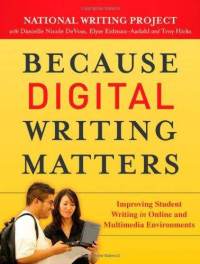 Because Digital Writing Matter by Danielle Nicole DeVoss, Elyse Eidman-Aadahl, & Troy Hicks Back Cover Blurb: "The connectivity of the internet and the latest digital technologies have opened vast new opportunities, format, and audiences for writing. Digital writing involves more than just word processing an essay or punching out an e-mail message; students can blog, text message, chat online, or create narratives for multi-media productions. Based on case studies, interviews with educational professionals, and a decade's worth of research, BDWM offers proven strategies to equip students with the communications skills that will enable them to thrive in our information-rich, high-speed, high-tech culture." I just received my copy of Because Digital Writing Matters today in the mail. As both a technology enthusiast and a member of the PBWP, I felt a need to read this book released by the NWP. I'm only about 30 pages into the book, but I;m already finding a lot of good points that the book raises.
0 Comments
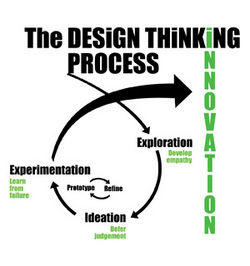 I was initially introduced to the concept of Design Thinking last summer at the PBWP ISI, and then revisited the ideas with a deeper sense of understanding when I attended a workshop of Design Thinking. Lately, however, I've been attending workshops and I keep finding myself connecting the concepts that I'm hearing iterated time after time back to the ideas that I encountered in design thinking. The idea of teaching students to be "creative problem-solvers" seems to stand out above the bunch. 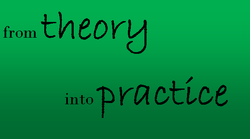 As the upcoming school year draws closer and closer, and my determination to incorporate design thinking into my curriculum becomes more resolute, the question that I find myself posing is: How will I implement this? How will I transition from admiring the theory behind it, into actually putting it into practice? My answer, simply put, is to start small. I plan on introducing my freshmen honors students (because I have only one hour of honors, not because I don't think other ability levels would understand design thinking) to the process of design thinking, and to have them construct their own novel projects. Hopefully, if things go well, I will be incorporating more design thinking in that class as the year goes on, and also introducing it to other classes. I'm excited to see what my students will come up with when given the opportunity to stretch their creativity muscles. On the other hand, if my first attempt at design thinking does not go perfectly, I plan on embracing my failure and re-approaching my lesson. In short, I'll apply some of the concepts of design thinking to my own lesson-planning in order to make my practices stronger and more effective. 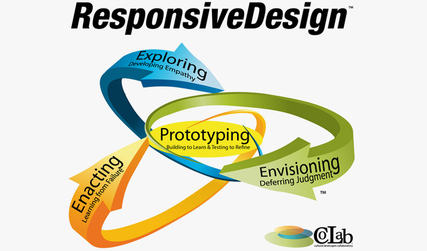 The Responsive Design model used by The Collaboratory is similar to the Design Thinking model. This is the model that I will be using with my students during the 2011-2012 school year. I plan to first introduce the concept of "Responsive Design" with an activity that asks my students to create a prototype of a pencil holder. Then, I will have students reflect on the process/model in writing. Eventually, my goal is to have students design their own novel projects. 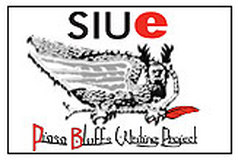 DAY 1: June 1, 2011 Quick-Write #1: What are your goals for the writing retreat? My main goals are to reconnect with myself as a writer, and to try out a writing assignment that I want my students to complete next year. I have some pictures of my home town that I'm going to use as writing prompts for creative writing genres, including poetry, vignettes, creative nonfiction, and short stories. Next year, I hope to use this writing project with The House on Mango Street. I want this project to make students think about their culture, their surroundings, their identity. It reminds me of the map writing that we did at the summer ISI. I want my students to have that "a ha" moment that I had when I realized that I am, in part, a product of my environment. Quick-Write #2: What challenges are you facing as you write? Right now, I'm dealing with my inner critic as I write my thesis. It's such an overwhelming and daunting task that I don't know where to begin, so most days I just don't. I don't want my thesis committee to think that I'm stupid. I know they will criticize my grammar, my style, my organization, my sources, my thoughts. I keep waiting for ideas to click magically into place, forming sheer poetry on the page. But I know it doesn't work that way. Funny that I don't feel that way when I'm sharing much more personal writing with my fellow PBWP'ers. I can tell them about my childhood memories, my loves and losses, my fear and dreams, but I can't begin a research paper about Shakespeare. Arg! I feel that the PBWP is such a supportive community, with no ulterior motive. I wish I could open up the doors and bring this level of support into my own classroom. 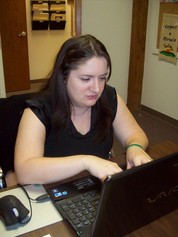 DAY 2: June 2, 2011 Quick-Write #1: How is my thinking changing? I'm trying to silence my inner critic. He's not a very good critic anyway, just prolific. I'm trying to remember that the importance piece is that I just write, that I put pen to paper (or fingers to keys) and just go. There will be time for perfecting it later. Right now is the time for the untethering of ideas, of freeing them from the bondage of the critic. What advice would I give to the student with writer's block? I'm stopping more frequently to tie my own experiences as a writer with those of my students. More metacognition. Making more connections. Letting my personal style as a writer shine through. These are things I want for my kids. It's okay to want them for myself, too. Quick-Write #2: "We wrote. We listened. Then we wrote some more." How is this process impacting my writing during this retreat? I love that we are each writing things that are so different. It reminds me that writing is not a narrow concept that can fit into a prefabricated box, but a term that encompasses so many different ways to express thought. Even though I’m focusing on my own writing, I find myself wanting to steal the ideas of my colleagues for a later date. I loved Dawn’s variation on Giving Tree. I wonder what I, or my students, could do with that. I loved Susan’s vignettes from yesterday about teasing her brother and other childhood experiences. How do I guide my students to produce that kind of poetry? Wenifer’s sense of voice is always to be envied. Does my writing have my voice in it? I’m remembering that article Dawn mentioned yesterday, asking “Are you in this paper?” I like Jean’s reflections on how far her students have come, each of them, not just the cream-of-the-crop writers. How can I make my students see for themselves how far they have come? I can’t be anyone else but myself, as a writer, and that’s okay. But I can let the writing of others inspire me to become better at my craft. 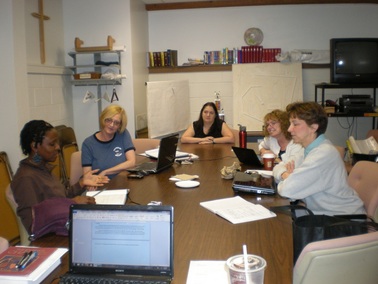 DAY 3: June 3, 2011 Quick-Write: What about this experience are you going to take away with you? In what ways will you continue self-discovery in yourself as a writer? I would have to say that this writing retreat was most valuable because it rekindled my awareness of myself as a writer. Sometimes I make too many excuses for not writing; being “too busy” is my go-to alibi. But here, among fellow writers, in a safe and welcoming atmosphere, I am supported and encouraged to write. Since attending the ISI, I have been more diligent about writing. I keep a folder on my computer of poems that I have written, and I have started more poems within the last year than I have had the courage to write in all my years leading up to the ISI. I have begun submitting some for publication, and I don’t always get accepted, but that’s okay. The point is that I’m writing and I’m sharing and I’m more actively participating in the writing community. I’m also blogging about my experiences with technology in the classroom. It started as an easy way to keep track of all the cool stuff that I’ve encountered through workshops and Google searches, but now it turns out that I’m actually helping other people by sharing my own experiences. What a wonderful gift to be able to reach out to others who I have never even met! I’m trying to make myself a more well-rounded writer. I hope to come back to this retreat next year—hint hint—and do some professional writing about lessons that I have “tried on” this year, with the intent of submitting something to a professional journal. I just keep pausing to remind myself not to forget these past few days when I go back to my classroom in far too few weeks to think about. I can’t be blind to the connection between myself as a writer and my students as writers. The new crop of kids that will be showing up in my classroom on August 12th will have some struggling writers, so I must not forget what it’s like to struggle. That group will also have some kids who, like me as a youngster, enjoy writing. I must do everything in my power not to extinguish that passion for writing, but to also challenge them to grow their writing roots in new ways, trying new genres or strengthening their skills in familiar ones. The best way for me to teach writing is to be a writer. Note: You can read more about the summer writing retreat, including posts by other retreat participants, on the PBWP Ning HERE. |
AuthorJessica Pilgreen is a high school English teacher, a Piasa Bluffs Writing Project fellow, and a technology enthusiast. The main purpose of this blog is to help her keep track of all of the fabulous tools out there that she has encountered, but if she can help a few others along the way, that's good, too. Archives
September 2011
Categories
All
|
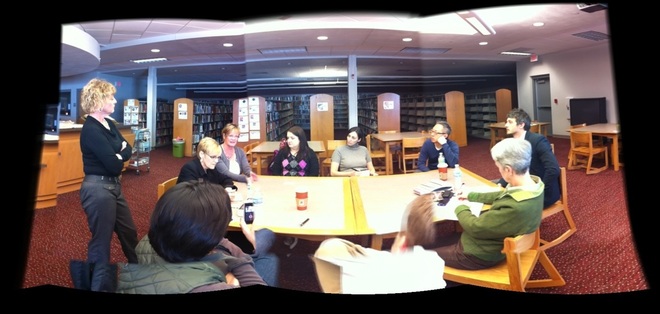
 RSS Feed
RSS Feed
